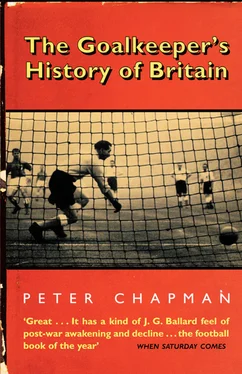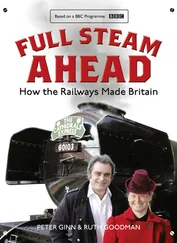In the last ten games between England and Scotland either side of the war, each had won four, with two drawn. Swift was chosen, the selectors still not ready to forsake his experience and make his execution too blatant. That was largely taken care of in the match itself by the Scots keeper, Jimmy Cowan, of Greenock Morton. Few people in England had heard of him but, at Wembley and with a performance that was the highlight of his career, Scotland won 3–1. Swift, by comparison, looked jaded. He was at fault with one of the goals and injured a rib when one of the Scots forwards had the temerity to shoulder-charge him. The selectors felt more justified in replacing him.
On the 1949 post-season tour of Scandinavia, they chose Ditchburn for the reasonably stiff task of facing Sweden in Stockholm. Sweden were remembered as gold medallists at the London Olympics the year before. Nevertheless, most of them were still mainly amateurs. From undiscovered centres of footballing excellence like Norr- and Jönköping, Swedish players likely passed the their days as steambath masseurs and cross-country ski instructors. In four previous internationals they had not got within two goals of England.
Captain Billy Wright made the first mistake when, having won the toss, he elected to play into the setting sun. It dipped slowly below the Swedes’ crossbar for much of the first half and into Ditchbum’s eyes at the other end. On the high ball particularly he did not ooze confidence. Worse, as England lost 3–1, he was held to have abused that placed in him by the selectors. He had been invited into their high-risk strategy of toying with the public mood as they displaced Swift. Now they’d been embarrassed. Swift was brought back against Norway, for an easy final international of his career. Ditchbum the selectors sniffly dropped from the reckoning.
They knew they’d find support among the fans. Ditchbum’s popularity on his home ground at White Hart Lane was unconditional but Swift’s enormous national following would have had its fair number of sceptics whoever was replacing him. My dad’s first reaction to mention of the Spurs’ keeper’s name was to scoff. If pressed, he would concede that Ditchbum was a ‘good keeper’, but given my understanding that British keepers were habitually brilliant, it followed that all of them were at least ‘good’. To say so was hardly a compliment.
Spurs were top of the Second Division and the most exciting London team of the season. As well as Ditchbum, they had full-back Alf Ramsey and inside-forward Eddie Baily, both pushing for places in the national side. Ron Burgess was captain of Spurs and Wales and the year before had played left-half for Britain in their 6–1 win against the Rest of Europe. They pulled crowds of more than 50,000 to White Hart Lane fifteen times during the season. The attendance for the visit of Queens Park Rangers was 69,718. Your arms were pinned to your side, my dad said. Lift them to applaud or wave around and you wouldn’t have got them down again.
The game in October was another one-sided contest in which Ditchbum had very little to do. On one occasion when he did – out of character and bored out of his mind – he jumped a little extravagantly at a shot which needed only a simple catch, and spilled the ball. Under no pressure, he retrieved it hobbling in his 6-yard area. He even put on a bit of a smile to the packed terraces. This worked well enough for the Tottenham faithful but my dad was near apoplectic. In his view, the Spurs’ keeper was not only an unworthy pretender to Swift’s national selection, but also a poor imitator of his style. ‘He should have stuck to goalkeeping, not clowning around,’ he said. ‘He could never do it like Frank could.’
Spurs won but their constant attacks managed only a single goal – a lucky bounce off Baily’s shin. QPR’s keeper, Reg Allen, otherwise stopped everything: ‘The finest display of goalkeeping seen by any man,’ said my dad, adding that it finally got him over missing Swift in Florence three years earlier. Allen, a former commando, had spent four years in a harsh German prison camp, which later caused him bouts of heavy depression. He left the field at the end of the ninety minutes, to an enormous ovation from the crowd, with head bowed and an embarrassed, barely detectable smile. Manchester United bought him soon after for £10,000. the first five-figure fee paid for a keeper (inexplicably, centre-forwards were going for three times the price).
One of Allen’s best moments in the match caused the crowd to surge forward for a better view. A steel barrier buckled and spectators fell in front of my father in a heap. If any more had gone down there’d have been injuries and quite possibly a disaster. But thanks to a bit of luck, and several years of army PT, he stayed on his feet. When he got back home, I’d been crying most of the afternoon and my mum had been left holding a three-month-old baby for the sake of a game of football. It was a natural enough moment to leave off watching it for a while.
After England’s defeat in Sweden the selectors went for Bert Williams of Wolverhampton Wanderers. He had played in one wartime international while still on the books of Walsall, a Midlands club of limited ability and such uncertain geography that in the 1930s it bounced between the Third Divisions South and North. Walsall’s greatest moment had distracted focus from Hitler’s ascent to power. In the winter of early 1933, and within the shadow of the laundry chimney at the side of their ground, they’d taken Arsenal to the cleaners, 2–0, in the Cup. The two seasons before the war, as Williams was finding his feet in the team, Walsall had been on more familiar form and at risk of dropping out of the football league altogether.
Walsall’s manager in the late 1940s was none other than Harry Hibbs. If old Harry saw something in Williams, the selectors reckoned they might, too. In his wartime international against France in 1945, he’d made a mistake in the first couple of minutes and the French had scored. But he had retained his nerve, recovered from the setback and played well in the rest of the game. Stan Cullis, returning from his role as a wartime entertainer of the troops to become manager of Wolves, bought him for £3,500 and Williams was elevated to football’s top flight, the English First Division.
Blond-haired and of the same age and frame, Williams looked like my father in his army photo wearing uniform and shorts in Algiers in 1943. At the age of fifteen Williams had been only 5 feet 2 inches tall and built himself up with exercises, which included dangling by his arms from door frames. He grew 8 inches in two years. He was another PT boy, a former instructor at the same RAF camp as Ted Ditchbum. A high-class sprinter, he could speed off his goalline for crosses, or to get down at the feet of onrushing forwards. His saves were often dramatic; he covered huge distances with his dives. These midair gyrotechnics were certain to raise the spirits of a crowd, and have a similar effect on the eyebrows of the selectors. But if he wasn’t their automatic choice, he had an undeniable quality. There was no doubting his seriousness.
Williams was shy and quietly spoken. In no picture I saw of him was he smiling, but since he looked like my dad I imagined he did. From Staffordshire, he lived several miles from the Wolves ground, a distance he would walk each training and match day on his toes and the balls of his feet. His reckoned that to rest back on your heels left you ill-prepared for sudden attack. He had a tortured look and masochistic edge. His training programme comprised a tireless stream of handstands and somersaults into mud. He’d round things off with a full-length dive on concrete.
Williams was the ideal compromise for the England goalkeeper’s job. He had enough of what, from their varying perspectives, the selectors and fans wanted. The sharp shift from Swift to Ditchbum – triumph to reality – had been too much. Williams borrowed from both styles and was perfect for the transitional times. He mixed drama with dour necessity. He was the first keeper I heard my dad describe as ‘spectacular but safe’.
Читать дальше












